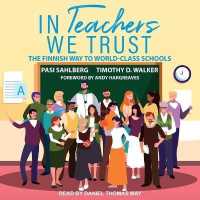Full Description
Real-Life Distance Education: Case Studies in Practice documents and discusses the experiences of those who have implemented distance learning as a solution to "real-life" problems and provides guidance to assist readers in their understanding and analysis of distance learning. This approach allows readers to develop analytic and problem solving skills. The variety of different situations within the individual case studies allows readers to apply their knowledge to new and unique situations and to explore solutions to complex issues. The book is useful as a primary or supplementary text in programs of educational technology, instructional design, learning sciences, human resource development, curriculum & instruction, media & technology or higher education.
Contents
Preface, Anthony A. Piña and Al P. Mizell.
Part I. Teaching At A Distance.
Chapter 1. Incorporating Self-Regulated Learning Strategies in Online Courses, Bruce R. Harris and Anthony A. Piña.
Chapter 2. Strategies for Overcoming Common Obstacles in the Online Environment: Issues in Virtual School Teaching, Michael K. Barbour and Kelly L. Unger.
Chapter 3. The Power of Presence: Our Quest for the Right Mix of Social Presence in Online Courses, Joanna C. Dunlap and Patrick R. Lowenthal.
Chapter 4. Individualizing Feedback: One Path to Success in a Distance Learning Environment, Roberta Ross-Fisher.
Chapter 5. Using Narrative Inquiry for Online Educational Assessment, Lesley S. J. Farmer.
Part II. Collaborating At A Distance.
Chapter 6. E-Collaboration Challenges, J. Ana Donaldson.
Chapter 7. Facilitating with the Learner in Mind: Strategies for Cross-Cultural Online Collaboration, Larissa V. Malopinsky and Gihan Osman.
Chapter 8. Supporting Adult Learners' Authentic Learning Experience by Optimizing Collaborative Group Work in Distance Learning Courses, Eunjung Oh, Ying Liu, and Thomas C. Reeves.
Chapter 9. Experiences in Cross-Institution Online Teaching Collaborations, Anthony A. Piña and Julian Scheinbuks.
Part III. Designing Distance Education.
Chapter 10. Applying Web 2.0 for Learning While Avoiding Cognitive Overload: A Challenge, Lauren Cifuentes, Omar Alvarez Xochihua, and Janine C. Edwards.
Chapter 11. Consulting and Designing in the Fast Lane, Ludwika A. Goodson and In Sook Ahn.
Chapter 12. Emerging Technologies: Purpose and Practice in Online Learning, Kim A. Hosler.
Chapter 13. Promoting Interactivity in a Distance Course for Nontraditional Students, E-Ling Hsiao and Xiaoxia Huang.
Chapter 14. Continuous Improvement: The Case for Adapting Online Course Templates, Kathryn Ley and Ruth Gannon Cook.
Chapter 15. Evaluating Online Courses: Seeking Instruments and Evaluator Competencies, Joi L. Moore and Camille Dickson-Deane.
Chapter 16. Online Doctoral Minor in Conflict Resolution: A Case Study in Instructional Design, Linda Agustin Simunek, Tatjana Martinez, and Judith Slapak-Barski.
Chapter 17. Application Of Ning in A Graduate Level Course and Its Effect on Student Use, Monica W. Tracey, Kelly L. Unger, and Matthew Schwartz.
Part IV. Developing Programs.
Chapter 18. SAXophone: Creating a Global Videoconference Project, Al P. Mizell.
Chapter 19. Faculty Development: Features and Guidelines to Improve Online Course Communications, Kathryn Ley.
Chapter 20. Professional Development and Training for Distance Instructors in Higher Education, Xiaoxia Huang, E-Ling Hsiao, and Les Lunce.
Chapter 21. Designing and Maintaining an Online Degree Program Serving a Diverse Student Population, Karen Kaminski.
Chapter 22. The Public Administration Program at Churchampton College, UK, Angela D. Benson and Andrew Whitworth.
Chapter 23. Hybrid Flexible Library Instruction (HYFLI), Brandon C. Taylor and Rosalind L. Fielder.
Chapter 24. Challenges in Putting a Doctoral Program Online, Al P. Mizell.
About the Authors.








